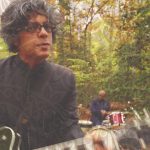Album Review: This Darkness by Scott Clark
Breathing. It’s easy right? In, out. You’re doing it now without even thinking about it. But as any horn player or yoga practitioner will tell you, you’re barely scratching the surface of what drawing breath can achieve until you bring intent into the mix.
Ever since I heard his 2015 album, Bury My Heart, I’ve admired the intentionality that Richmond-based drummer and composer Scott Clark brings to his music. The title refers to Bury My Heart at Wounded Knee, the bestselling book by Dee Brown about the Native American genocide of the 19th century. The liner notes for Bury My Heart cite Clark’s own Native ancestry, and the album paints a sobering sonic picture, with passages of deep solemnity, atmospheric dissonance, and rhythmic tumult, and track titles that reference dark chapters like Little Crow’s War and the Sand Creek massacre.
Clark’s 2018 album ToNow brought those themes into the present day by zooming in on the Standing Rock protests, which began in 2016 with the aim of blocking construction of the ill-considered Dakota Access Pipeline. The four compositions that form ToNow work as a suite, each section representing an aspect of the protests, from the Standing Rock reservation and its surrounding landscape to the colors of the reservation’s flag and the creek that became the protests’ epicenter. Together, Bury My Heart and ToNow form a powerful statement of artistic purpose — undeniably weighty, but profoundly hopeful, and indicative of Clark’s belief in music’s ability to communicate hard, important truths.
I’m always fascinated by how jazz compositions got their names. Growing up listening primarily to rock meant song titles were almost always taken from their lyrics. Not a whole lot of mystery there. Later, as I worked toward a meaningful connection with jazz, I found myself interrogating what seemed to be a tenuous relationship between songs in which language is absent and the words used to describe them. That curiosity bordered on scepticism, and it boiled down to two sticking points: As a musician, can you really say something with instruments alone? And as a listener, how do you hear what someone is trying to say?
The former seems ridiculous in retrospect; people have been storytelling this way since music’s inception. (Prokofiev’s Peter and the Wolf is all the evidence you need. I’m especially fond of David Bowie’s version.) Conversely, the latter has gained relevance — less a question at this point than a discipline I hope to keep working at until the day I die. I’ve learned a great deal about listening from Scott Clark’s music. I’ve put on “Broken Treaties” and cast Bob Miller’s trumpet as a narrator plaintively addressing the audience before walking us through centuries of bad dealings reenacted by swirling saxophone, trombone, and bass clarinet. I’ve closed my eyes as “Plains” unfolded, aligning the tense atmospherics, finely traced guitar lines, and bold rhythmic contours with the photos I’ve seen of the Standing Rock protests and the surrounding area, like a slow and heartbreaking cinematic establishing shot. In those moments, I’m connecting with Clark’s gift as a storyteller — decoding what he’s encoded, building a mental image that brings me closer to events this country is so eager to distance itself from. (Kahil El’Zabar’s brilliant 2020 album America the Beautiful functioned similarly, with tracks like “Jump and Shout [For Those Now Gone]” and “Freedom March,” whose titles doubled as instructions for how to listen most effectively.)
There’s another way I’ve heard and learned from Clark’s albums, a method that’s less about narrative and more about meditation. Using track titles as jumping-off points, I’ve let the moods and timbres guide reflection that matches the music to my own sense of complicity in events like the ones Clark portrayed. It’s amazing where a piece like “Stand” can take you when you decide to let it sit in the driver’s seat for 13 minutes — the dusty corners your mind wanders to that it might not have otherwise. Distraction plays such a large role in a society’s collective forgetting of its misdeeds. Intent is the antidote, and Clark’s music creates time and space to consider America’s history and your place within it.
With This Darkness, a new set of solo drum recordings released this past Friday via Out Of Your Head Records, Clark has brought this mode of focused listening to the forefront, while continuing to explore and elucidate the connectivity between language and music.
This Darkness draws inspiration from a poem by the Bohemian-Austrian poet Rainer Maria Rilke, whose works and correspondence touched on themes of solitude and anxiety — topics as relevant to our current moment as they were near the start of the 20th century, when Rilke was writing. Speaking to RVA Magazine, Clark described placing Rilke’s “Let This Darkness Be a Bell Tower” on a music stand and playing to the poem, and the resulting six tracks draw their titles from Rilke’s words such that scanning the tracklist means you’ve just read two of the poem’s early lines. It’s a simple yet elegant gesture that speaks volumes about Clark’s approach to composition — his attentiveness to the listener’s experience — and about the ideal way to move through this specific album.
The full text of the poem appears on Bandcamp, and I can’t recommend reading it highly enough, both as a way to engage fully with This Darkness and as a thread that connects the album to Clark’s earlier works. I’m especially struck by the third line, which appears between the two that gave This Darkness its track names. Per Joanna Macy’s translation, it reads: “feel how your breathing makes more space around you,” echoing Clark’s own grasp of intentional spaciousness. Opening track “Quiet Friend” provides just that, with an extended harmonica drone that ebbs and flows with a cadence that naturally invites respiratory participation. It’s tempting, even, to place a comma between the title’s two words and read it as an instruction, the kind that might precede a softly stated request to close your eyes for a centering exercise.
But This Darkness is so much more than a soundtrack for achieving serenity. The tolling in “Who” and chiming in “Has Come So Far” aren’t there to soothe; they’re urgent and close. Even the overtones seem to be coming from inside the house. The frenetic brushing in “Let This Darkness” is unyielding, like a persistent stare you can’t resist returning. Throughout, the lack of melodic structures challenges the listener, with the sparseness functioning as a mirror for the internality that 21st-century life practically demands you tune out. Other sections directly confront notions of what is and isn’t a pleasing sound for a drumkit to make. (The scraped cymbal in “Be A Bell Tower” is notable on that front.)
As much as this album departs from the richer ensemble sound of Clark’s previous recorded work, it falls right in line with Bury My Heart and ToNow in the way it ventures bravely into difficult sonic realms. In doing so, he has engineered another through-line to Rainer Maria Rilke’s writing, which talked about the role sadness can play in self-improvement. In Letters to a Young Poet, Rilke wrote:
“The more still, more patient and more open we are when we are sad, so much the deeper and so much the more unswervingly does the new go into us, so much the better do we make it ours, so much the more will it be our destiny…”
Rilke suggested that a better future already exists in the present, and that looking inward, especially when we’re hurting, is part of realizing it. Clark’s music stands out in its willingness to forge pathways to those places where introspection is needed most. The neglected places. The shameful places. There is just so much of that to contend with right now. It’s encouraging to think somewhere in there is a seed of progress waiting to grow. It’s equally encouraging to have music to turn to when you want to work toward cultivating it, and This Darkness is exactly that.
It’s an interesting coincidence that Clark’s new album came out on the street date for Tyler Childers’ Long Violent History, an album of eight instrumental string tunes designed to lay a foundation of reflection for its ninth and final track, a direct lyrical appeal to fans who haven’t yet squared their consciences with the murder of fellow Kentuckian Breonna Taylor. I’ve found Long Violent History to be incredibly moving, and as hard as that last track hits, the journey leading up to it can be even more rewarding, given that it requires my participation. I get what I give. Therein lies its connection to This Darkness; both albums offer a guiding hand in terms of how to listen, yet both make room for the listener to contribute something in return: intention.
Another interesting parallel: Like Long Violent History, you could say that the final chapter of Clark’s latest is where its creator feels most present. While pieces of his technical toolkit are displayed throughout the album, “And You The Bell” is where they converge for a vivid expression of skill and feel that rings out long after the final roll fades. I listened to This Darkness in full on a run that turned out to be a few minutes longer than the album’s duration, and the thought of chasing it with other music was a total non-starter, like I’d be throwing away the sense of peace I’d just achieved. I very rarely run without some sort of audio in my ears, yet in that moment, the inside of my own head seemed like genuinely good company — maybe even the quiet friend that Rilke wrote about.
This Darkness is out now, available digitally and on a limited 12″ vinyl through Out Of Your Head Records. To purchase or stream two tracks now, please click here.




